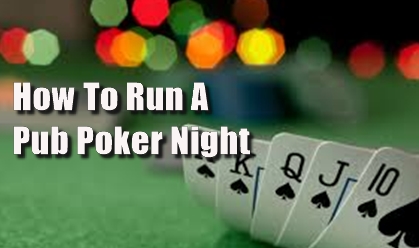Over the last few years hosting poker nights in pubs has become an increasing feature in many pubs’ entertainment programs, they bring new custom and encourage repeat custom. However, the law on betting and pubs (The Gambling Act 2005) is quite specific and if you are, or are considering hosting a poker night in your pub you need to make sure you understand and stay within the law. This guide will help you put on a successful and legal poker night and is in line with Gambling Commission advice.
Poker can be played in your pub as long as you follow the conditions relating to the limits on prizes or levels of stakes that can be played. As pubs are licensed under the Licensing Act 2003, your local licensing authority can take action against you if you don’t comply with these conditions.
As long as your poker tournament or poker league is exclusive to your pub an not ‘linked’ to games being played in other premises then your poker playing will be legal. A ‘linked poker game’ is defined thus:
- players in more than one pub are competing in the same game of poker across premises and the winner of that game of poker gets a prize
- the amount of the prize is determined by the number of people playing in different games of poker in different pubs.
A poker tournament organised by a poker league where the winners of games or top players in a series of games from various pubs go through to play in a tournament final would not be linked gaming, even if the final was held at another venue, for example another pub or licensed casino.
Stakes and Prizes
The amount each player can win depends on the number of games they’ve played in any given tournament, but you should always keep to the daily limit of combined stakes of not more than £100 per day, made up of a maximum stake per player of £5; this keeps the poker playing at the level of entertainment and not that of high-stakes gambling, which, is played in licensed casinos.
The maximum prize permitted is £100 per game and includes:
- money
- payments in-kind
- vouchers
- goods
- donated items (for instance at a charity poker night)
- goody-bags
- buy-ins at other poker tournaments
- other items which have a value.
In a tournament the prize structure works like this:
- A player in your pub league get to the tournament final by playing eight games in the league. Therefore the total prize can be no larger than £800 at the pub league level.
- If your league is part of, say, a regional league, then the player who wines your local league can then win a maximum of £100 at the regional final and, say, another £100 at the national final.
- If a player in your pub league only plays in five games in the league out of the eight games available, his or her total prize can be no larger than £500 at the pub league level. Again, the player can then win a maximum of £100 at the regional final and another £100 at the national final.
Entry Fees
You cannot charge a participation fee, including for example by having entrants pay a compulsory charge for a meal. The law says it is irrelevant whether the charge is said to be voluntary or compulsory, particularly if customers are prevented from playing if they do not make the ‘voluntary’ donation, or there is strong peer pressure to make the donation.
Private Poker Games and Poker Clubs
You might be considering using you function room, or you might be asked by customers to use your function room, to host a private poker game. The law recognises that poker run as private gaming can potentially take place where a group of friends or a members’ club hire a room in a pub for a private function where equal chance gaming only is played.
However, you need to be very careful that the designated area of the pub in which the gaming takes place is not open to members of the public. This means that the members of a poker club who only join the club a short time before the event would be deemed, especially by the courts, to be members of the public. So, for instance, you couldn’t host a poker club that allowed ‘instant membership’.
The law relating to what is private or public gaming is complicated and you should take legal advice before you host a private poker game or allow a poker club to use your premises for their games.
In any event a a condition of private gaming is that no charge is made for participation, including any deduction from (or levy on) amounts staked or won by participants in gaming is a charge for participation in the gaming.
For more information go to the Gambling Commission Website
For other card games you might wish to encourage in your pub, see this separate article Pub Card Games Explained.
